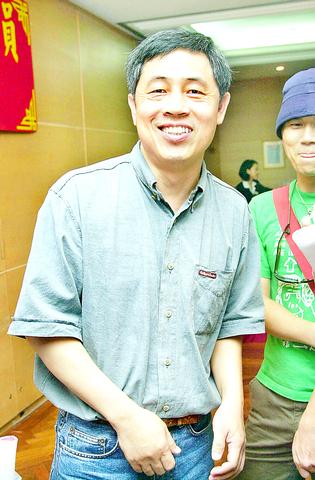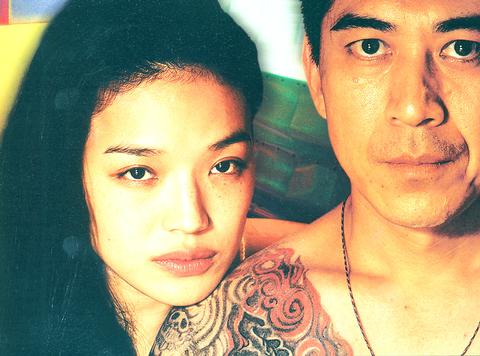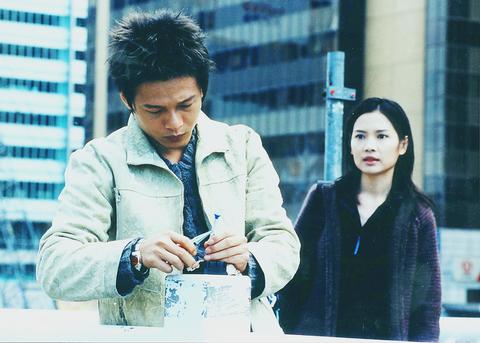A few years ago at an international film festival, Taiwanese director Wu Nien-jen (吳
Does the word `tu duu chih' mean `sound editing' in your language? The word is always seen at the credit roll."

PHOTO : WEI CHIA-CHIH, TAIPEI TIMES
Wu said that this was the name of a person -- it just happened that this person was virtually synonymous with sound editing in Taiwan.

PHOTO: FORTISSIMO
The man referred to was Tu Duu-chih (杜
This year at Cannes, Tu received the technical award for sound editing work on Millennium Mambo (千

PHOTO: HOME GREEN
"He has deserved the award for a long time now," said Hou, who directedMillennium Mambo.

PHOTO: CMPC
According to Hsiao Ya-chuan (蕭
A number of scenes in The Flowers of Shanghai centered on characters eating and drinking round a table. When the shot began, Hou would usually just say, "Okay, you can start now," and leave the actors to develop a situation through improvisational dialogue. "The recordist wouldn't know which lines spoken by which actor were the important ones," said Hsiao.
"The only thing you could do was to guess, and observe carefully," said Tu. "Sometimes you simply didn't catch anything to record, and the shot has to be made again," he said.
It is Tu's ability to work in the difficult circumstances of a Hou shoot that Hsiao, now a director in his own right, most admires about him. "It takes experience, intuition and courage to deal with that kind of situation," he said. "Having worked with Tu on my first short film, I have brought him in on all my other projects, if possible," Hsiao said.
Tu has always been in strong demand, and has been the sound editor for about 70 percent of Taiwanese films released since the mid-1980s.
One of Tu's major contributions to the Taiwan film industry has been the introduction of synchronized sound. The first such feature film in Taiwan to be shot entirely with sync sound was Hou's The City of Sadness (悲
In the 1970s and before, most Taiwanese films tended to focus on war, martial arts and family romance genres, in which sound was invariably dubbed. Even in the 1980s, when realism gradually became the cinematic mainstream, many films only had partial sync sound due to a shortage of technical personnel.
"Five years before the shooting of City of Sadness, about 20 years ago now, I began to work on the technique of synchronized sound recording," Tu recalled.
"At that time, a group of directors had recently returned from the US, and they gave me a chance to watch and learn during the post production process," Tu said of this period when he was an assistant in Central Motion Picture Corp's (CMPC) sound department.
"In the early days when we were making realist films, the boom poles we used for the mics were the kind of poles that people used to hang their laundry out on. The 32mm cameras we used were also very noisy, so they had to be covered with two to three blankets, so that after a few takes, the cameraman would emerge tired and sweaty," Tu recalled.
Tu's first use of sync sound was in a government project in conjunction with Edward Yang.
"The company assigned us a 16mm short film to promote a certain government policy. This was a great time to try the new technique [sync sound] -- even though we had to spend our own money to buy equipment."
After the success of City of Sadness, Hou bought a brand new set of sync recording equipment for Tu. "Hou thought the film was making money, and when he discovered there were bills still to pay, he'd already bought the equipment. So he had to take out loans to buy me the equipment, and I am still thankful for this."
With this new equipment, Tu began to work on more films using synchronized sound, taking the first steps to introducing this technique throughout the industry. "Now, only a couple of short films each year may not use sync sound," Tu said.
As a young man, Tu said, he loved stereos and so he looked for a job that dealt with the sound part of movies. "But later, I became fascinated by the use of sound in a movie context. This was when I fell in love with films, and the films of Hou Hsiao-hsien and Edward Yang in particular. From then on I endeavored to use sound to enhance the meanings they sought to express in their movies," Tu said.
Such is his commitment to cinema that even his memory is pegged to film. "I don't remember in what year my son was born. But I do remember that it was while I was working on Yang's A day on the Beach (海灘的一天).
Tu now has his own sound editing studio with a staff of eight that handles the sound editing for 90 percent of films made in Hong Kong and Taiwan. He himself is now currently associated with Chen Kuo-fu's (
But after 30 years of experience and a room full of prizes, his studio still failed to qualify for government subsidies supporting the local film industry. The reason is that he is only a studio, not a company.
"That's a bit funny but I don't care much," Tu said. "Doing a good job is more important to me. My greatest happiness is when a director tells me,`You make great sound.' I'm this kind of person."

Climate change, political headwinds and diverging market dynamics around the world have pushed coffee prices to fresh records, jacking up the cost of your everyday brew or a barista’s signature macchiato. While the current hot streak may calm down in the coming months, experts and industry insiders expect volatility will remain the watchword, giving little visibility for producers — two-thirds of whom farm parcels of less than one hectare. METEORIC RISE The price of arabica beans listed in New York surged by 90 percent last year, smashing on Dec. 10 a record dating from 1977 — US$3.48 per pound. Robusta prices have

The resignation of Taiwan People’s Party (TPP) co-founder Ko Wen-je (柯文哲) as party chair on Jan. 1 has led to an interesting battle between two leading party figures, Huang Kuo-chang (黃國昌) and Tsai Pi-ru (蔡壁如). For years the party has been a one-man show, but with Ko being held incommunicado while on trial for corruption, the new chair’s leadership could be make or break for the young party. Not only are the two very different in style, their backgrounds are very different. Tsai is a co-founder of the TPP and has been with Ko from the very beginning. Huang has

A few years ago, getting a visa to visit China was a “ball ache,” says Kate Murray. The Australian was going for a four-day trade show, but the visa required a formal invitation from the organizers and what felt like “a thousand forms.” “They wanted so many details about your life and personal life,” she tells the Guardian. “The paperwork was bonkers.” But were she to go back again now, Murray could just jump on the plane. Australians are among citizens of almost 40 countries for which China now waives visas for business, tourism or family visits for up to four weeks. It’s

A dozen excited 10-year-olds are bouncing in their chairs. The small classroom’s walls are lined with racks of wetsuits and water equipment, and decorated with posters of turtles. But the students’ eyes are trained on their teacher, Tseng Ching-ming, describing the currents and sea conditions at nearby Banana Bay, where they’ll soon be going. “Today you have one mission: to take off your equipment and float in the water,” he says. Some of the kids grin, nervously. They don’t know it, but the students from Kenting-Eluan elementary school on Taiwan’s southernmost point, are rare among their peers and predecessors. Despite most of